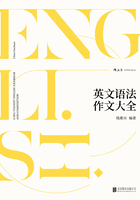
(21)动词的种类
语句的基本形式有下列五种:
〔第一形式〕Subject + Predicate
〔第二形式〕Subject + Predicate + Complement
〔第三形式〕Subject + Predicate + Object
〔第四形式〕Subject + Predicate + Indirect Object + Direct Object
〔第五形式〕Subject + Predicate + Object + Complement
以动词为主来分类的话,就是:
动词 |
不及物动词 |
完全不及物动词 |
〔 第一形式〕 |
|
不完全不及物动词+补语 |
〔 第二形式〕 |
|||
及物动词 |
完全及物动词 |
+一个宾语 |
〔 第三形式〕 |
|
+两个宾语 |
〔 第四形式〕 |
|||
不完全及物动词+宾语+补语 |
〔第五形式〕 |
|||
如上表所示,动词有不及物动词和及物动词两种,不及物动词又有完全不及物动词和不完全不及物动词之别,及物动词也同样地有完全及物动词和不完全及物动词之别。
1. 完全不及物动词(Complete Intransitive Verb)和不完全不及物动词(Incomplete Intransitive Verb)
a. 完全不及物动词
Pride goes before a fall. 骄者必败。
We sat under the shade of a tree. 我们坐在树荫下。
b. 不完全不及物动词
Health is wealth. 健康即财富。
Practice makes perfect. 熟能生巧。
2. 完全及物动词(Complete Transitive Verb)和不完全及物动词(Incomplete Transitive Verb)
a. 完全及物动词(有采用一个宾语的或采用两个宾语的)
Nobody can trust a liar. 谁也不相信撒谎者。
Waiter,bring me two eggs. 茶房,拿两个蛋给我。
He showed me the way to the science museum. 他指示了我去科学博物院的路。
When we parted,he wished me a good journey. 当我们离别时他祝我一路平安。
上例中的 me 为 Indirect Object,而 the way 和 journey,则为 Direct Object。间接宾语常置于直接宾语之前,但如置于直接宾语之后时,就得在其前面加用一个 to 字(如动词为 buy、get、make 等时,则加用 for)。
|
He sent me a photo. He sent a photo to me. |
他送我一张照片。 |
|
Father bought me a camera. Father bought a camera for me. |
父亲买了一架照相机给我。 |
|
Get me the book. Get the book for me. |
拿那书给我。 |
但直接宾语如为 it 时,则口语中常将 to 略去,如:
|
He told it to me. He told it me. |
他告诉了我那事。 |
|
He gave it to me. He gave it me. |
他把那个给我了。 |
b. 不完全及物动词(有时需要加补语)
His father made him a merchant. 父亲使他成为商人。
I found the book interesting. 我觉得那书很有趣。
比较: |
I made him a present. 我送了他一件礼物。 (完全及物动词,Dative Verb) I made him a servant. 我把他做佣人了。 (不完全及物动词,Factitive Verb) |
比较: |
I found the way easy. 我觉得那方法容易。 (不完全及物动词,easy 为补语) I found the way easily. 我很容易地懂得那方法了。 (完全及物动词,easily 为副词) |
c. 反身动词(Reflexive Verb)
在动词后面加 oneself 字样,但意义上常不要译出来。
I have enjoyed myself very much. 我玩得很快活。
The young man exerts himself to please his employer. 那青年勉力从事以博雇主的欢心。
He devoted himself to his work. 他献身于工作。
He absented himself from school for that day. 他那天没有上学。
He prides himself on his knowledge of English. 他对于他的英文颇为骄傲。
I shall avail myself of your kind offer. 我将拜领(利用)你的盛情。
I am afraid I’ve overslept myself. 我恐怕我睡得太多了。
I don’t want to overeat myself. 我不要过分地吃得太多了。
He applied himself closely to the study of French. 他孜孜不倦地在学法文。
Take care not to overwork yourself. 当心不要过劳。
How do you amuse yourself in rainy weather?下雨天你怎样消遣的?
He shouted(talked,sang)himself hoarse. 他大声地叫,喉咙都叫哑了。
试比较下列用 oneself 与不用 oneself 之例句:
He associated(= kept company)with pleasant companions. 他交际愉快的朋友。
He associated himself(= entered into partnership)with that firm. 他加入那公司做股东了。
He broke off(= discontinued)the habit. 他戒断了那种习惯。(一般的说法)
He broke himself off the habit. 他断然地戒绝了那种习惯。(加强的说法)
Guard against(beware of)that vice. 要戒备那种恶习。
Guard yourself(= take special precautions)against that vice. 要特别注意那种恶习。
He prepared for a lesson. 他准备功课。
He prepared himself for the examination. 他孜孜努力准备应考。
3. 英文动词大多数是不及物动词而兼及物动词的
They open the doors at nine. 他们九时开门。(及物)
School opens at eight o’clock. 学校八时上课。(不及物)
Bad men hide their faults. 坏人隐藏其恶。(及物)
Bats hide during the day. 蝙蝠昼伏夜出。(不及物)
He turned me out of the room. 他把我逐出室外。(及物)
He turned to me and spoke. 他转向我说。(不及物)
He feeds the horse with grass. 他以草饲马。(及物)
Many people feed on rice. 多数人以米为生。(不及物)
He spread his garment. 他铺开他的衣。(及物)
The mist spread over the earth. 地上满笼着雾。(不及物)
He closed the business. 他歇业了。(及物)
The day closed at six p. m. 天在六时断黑。(不及物)
The wind dispersed the clouds. 风吹云散。(及物)
The clouds have dispersed from the sky. 云从天散。(不及物)
那些只限于作不及物动词用的动词,例如:be、come、go、become、fall 等,是没有被动语态(Passive Voice)的。
4. 不及物动词作及物动词用的场合
a. 采用同源的名词作宾语的,即 Cognate Verb,其宾语就称为 Cognate Object。
He died a sad death. 他死得惨。
He lived a long life. 他命很长。
He preyed an earnest prayer. 诚心祈祷。
He slept a sound sleep. 熟睡。
He dreamed a pleasant dream. 做了一个愉快的梦。
He sighed a deep sigh. 长叹了一声。
He laughed a hearty laugh. 开心地笑了。
It is blowing a gale. 刮大风。
He struck a hard blow. 重击一下。
He fought a good battle. 打了一场好仗。
He ran a race. 他赛跑了。
He shouted his loudest(shout). 他大声呐喊。
He fought his best(fight). 他竭力奋斗了一场。
She sang her sweetest(song). 她唱了她最拿手的歌。
He ran his fastest(run). 他最快地跑了。
He breathed his last(breath). 他呼出了最后一口气。
b. 不及物动词用作使动(to cause)之意的。
He boils the water.(= He causes the water to boil.)他烧开水。(及物)
Cf. Water boils. 水沸。(不及物)
He grows wheat in the field. 他种小麦。(及物)
Cf. Wheat does not grow in Taiwan. 台湾不长小麦。(不及物)
He flew the kite. 他放风筝。(及物)
Cf. The kite flew in the air. 风筝飞上天。(不及物)
c. 不及物动词与介词同用时,便有及物动词的意味。这又称为 Prepositional Verb。例如:
The boys laughed at him. 孩子们笑他。
Please look after my little boy in my absence. 我不在家时请照顾我的小孩。
Have you sent for the doctor?你已经去请医生了吗?
5. 及物动词作不及物动词用的场合
a. 用作一般意义(general sense)的
The cat can see in the dark. 猫能在暗中看见。(不及物)
Cf. I can see nothing. 我什么也看不见。(及物)
We eat in order to live. 为生而食。(不及物)
Cf. I ate some beef at supper.晚餐吃了牛肉。(及物)
Man can speak. 人能说话。(不及物)
Cf. He can speak English very well. 他能说一口好英文。(及物)
He can neither read nor write. 他既不能读,也不能写。(不及物)
Cf. He is reading a novel while I am writing a letter. 他读小说我写信。(及物)
b. 及物动词用作不及物动词而具有被动意义(passive sense)的
This fruit tastes sweet.(= It is sweet when it is tasted.)此果甚甜。(不及物)
Cf. Have you tasted the fruit?你尝了那水果么?(及物)
The flower smelled fragrant. 此花甚香。(不及物)
Cf. The girl smelled the flower. 少女嗅花。(及物)
The article reads well. 那文章很好读。(不及物)
Cf. I shall read the article. 我将读那文章。(及物)
A villa is building.(= is being built)一座别墅在建筑中。(不及物)
Cf. They are building a villa. 他们在建筑别墅。(及物)
The guns are firing. 在放大炮。(不及物)
Cf. They are firing the guns. 他们在放大炮。(及物)
The book is printing. 那书在印刷中。(不及物)
Cf. They are printing the book. 他们在印那书。(及物)
c. 及物动词加副词作不及物动词用的
He made off(= ran away)with the money. 他卷款潜逃。
He set out(= started)at 4 p. m. 他下午四时出发了。
He turned out(= became)a prosperous merchant. 他变成一个富裕的商人了。
He got off(= escaped)unharmed. 他平安逃出。
He pushed on(= hurried forward)as fast as he could. 他尽速地前进。
Cholera has broken out(= suddenly appeared). 发生了霍乱。
He gave in(= yielded)after a short struggle. 挣扎了一下他就屈服了。